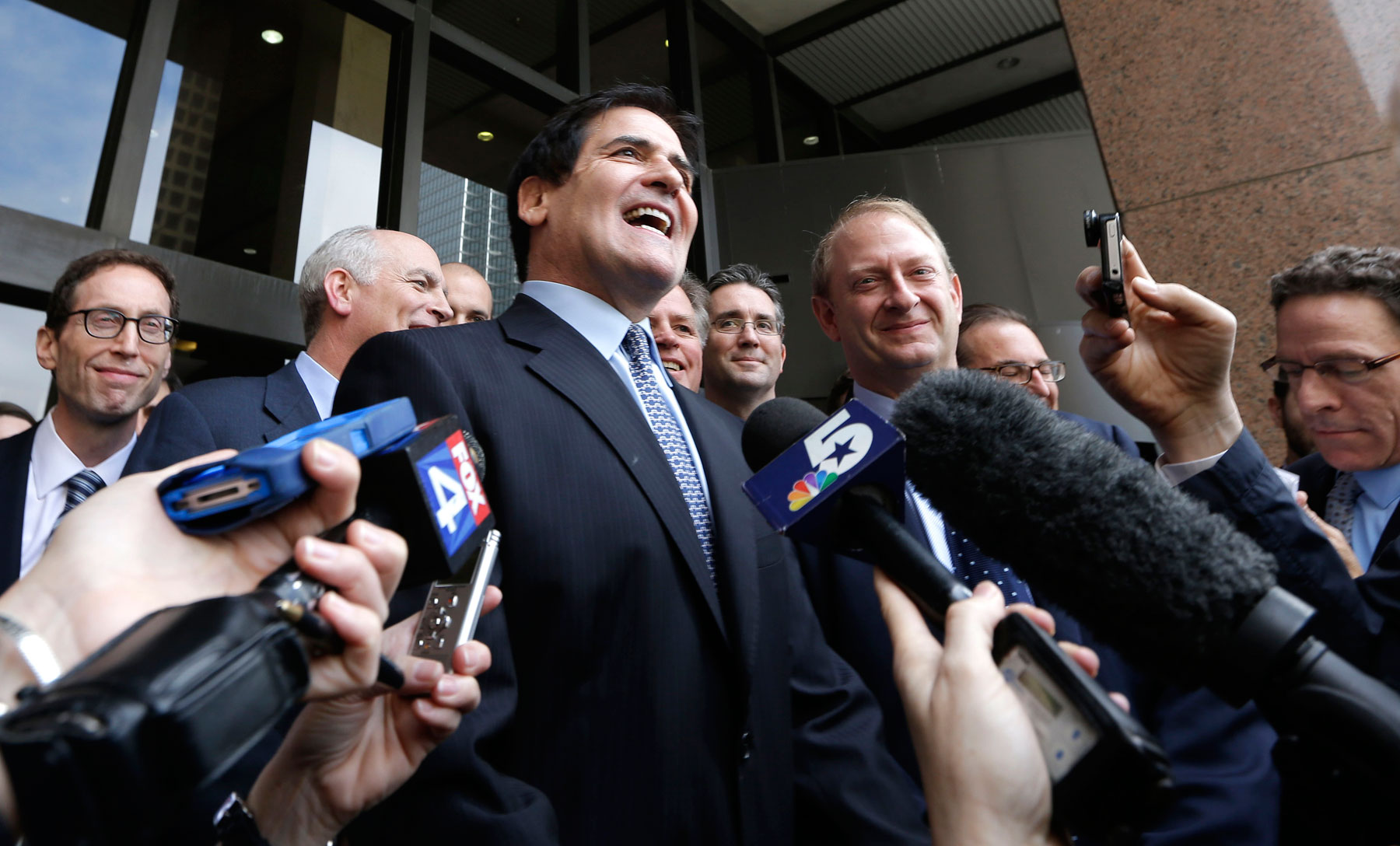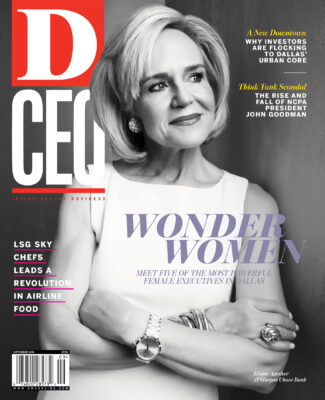In basketball terms, the SEC’s insider trading prosecution of Dallas Mavericks owner Mark Cuban last October should have been an evenly matched showdown. But instead of a close contest, the battle between Cuban and the federal government resembled the Harlem Globetrotters’ dismantling of the hapless Washington Generals.
Just how, and why, did the dispute get as far as a Dallas federal courtroom, and what were the keys to Cuban’s victory? And from the SEC’s perspective, what does such a high-profile loss mean for future insider trading prosecutions?
The saga began back in June 2004, when the billionaire sold his 6.3 percent stake (about 600,000 shares) in Canadian Internet search company Mamma.com. The sale was worth $7.9 million. By ridding himself of his shares, Cuban avoided a loss of about $750,000 when the value of the stock later dipped. According to Cuban’s trial testimony, he had doubts about Mamma.com’s integrity on two fronts. The first was the possible connection he learned of in April 2004 between the search company and known stock swindler Irving Kott. The second was Mamma.com’s plans for a stock offering through a PIPE (a private investment in public equity). Cuban testified that he spoke on multiple occasions about his intention to sell his stock, and that he believed the PIPE offering was a signal of financial distress.
The SEC’s case, on the other hand, hinged on how he learned of this plan. It alleged that during an unrecorded phone call in June 2004 with former Mamma.com CEO Guy Fauré, Cuban received “confidential” information about the planned offering, and supposedly said, “Now I’m screwed. I can’t sell.”
Based on this supposed inside information and Cuban’s alleged use of it to avoid a $750,000 loss, the SEC initiated an investigation that culminated in the filing of a November 2008 civil lawsuit against Cuban in the U.S. District Court for the Northern District of Texas in Dallas. The government charged Cuban with insider trading, a violation of Section 17(a) of the Securities Act of 1933, Section 10(b) of the Securities Exchange Act of 1934, and SEC Rule 10b-5.
Although Cuban could have avoided trial by paying about $2 million in fines, he was adamant about vindicating himself.
Although Cuban could have avoided trial by paying about $2 million in fines, he was adamant about vindicating himself. At a recent seminar about the case, Cuban’s longtime general counsel Robert Hart said that, although he and others encouraged the billionaire to settle and avoid the stress and cost of litigation, Cuban refused because of his three children. Hart said Cuban told him: “This is my legacy. I don’t want them to look me up one day on Wikipedia and say, ‘Daddy scammed.’”
Vindication would not come cheap. Legal observers peg this as one of the SEC’s most costly prosecutions ever, and some estimates of Cuban’s litigation tab run as high as $16 million. Cuban admits to spending “a lot more” than what he was risking on the case. At the seminar, Hart played a pre-recorded interview with Cuban, who advised: “If you’ve got resources, fight [the SEC], because they’re not that smart.”
LOCAL SUPPORT
Cuban’s defense team included local trial lawyer Tom Melsheimer, managing principal of Fish & Richardson’s Dallas office (named 2014’s “Trial Lawyer of the Year” by the Dallas Bar Association). Although Cuban’s attorneys from New York and Washington, D.C., had considerable securities litigation backgrounds, Melsheimer, who has represented Cuban since 2000, offered a key advantage. “I was brought in because I knew how to try a case in Dallas, Texas,” he says. Melsheimer says the case came down to the contrast between the two central witnesses. Mark Cuban testified live and was cool under pressure—engaging and even funny as a witness. “The jury wanted to believe him,” Melsheimer says. Cuban testified that although he couldn’t remember details from the phone conversation with Guy Fauré, he was never told the information was confidential, nor did he promise verbally or in writing to keep it confidential.
In stark contrast to Cuban’s live connection with the jury, the government could only play a videotape of Fauré’s 2011 deposition testimony, as the Canadian citizen had refused (and could not be compelled) to travel to the United States and testify. Without a live witness to assess for credibility, the jury was left with Melsheimer’s exploitation of Fauré’s absence. He pointed out multiple changes in Fauré’s testimony, and speculated about the real reason why the Canadian was a no-show. “He’s the alleged victim to the fraud,” Melsheimer says. “You would think that someone who’s the victim of a fraud would want to show up and testify and get redress for their injury.”
The SEC fared no better with the prerecorded testimony of former Mamma.com chairman David Goldman. Another prosecution witness, investment banker Arnold Owen, who worked for a bank hired by Mamma.com to find potential investors, wound up testifying that he didn’t believe Cuban was barred from selling his stake in the company or required to keep the 2004 Fauré phone call confidential.
To make matters worse for the SEC, the defense presented an expert witness and former SEC official, Dr. Erik Sirri, who dramatically undercut the government’s position that the information Cuban allegedly traded on was material and nonpublic. Sirri showed the jury website postings and the SEC’s own records showing that the public had access to the same information that Mark Cuban had before making the trade. Sirri also prepared a study demonstrating how the market reacted to Mamma.com’s private offering announcement, and testified that the study showed that market reaction was not “statistically significant,” casting further doubt on how “material” this information could have been.
After a three-week trial, the jury deliberated for less than five hours before reaching a verdict in Cuban’s favor. Afterward, the typically outspoken Cuban declined to compare the victory to the NBA championship his team won in 2011, saying that he “won nothing today,” and that the fight was all about “truth and justice.”
Although SEC official spokesman John Nester said in a written statement after the trial that the verdict “will not deter us from bringing and trying cases where we believe defendants have violated the federal securities laws,” legal observers say the impact of the Cuban verdict will be felt for quite some time.
Jeff Ansley, a former SEC and DOJ prosecutor who is now a partner at Dallas’ Bell Nunnally & Martin, points out that both public perception and the litigation risk that comes with any case are bound to impact future SEC decisions: “That litigation risk, and the SEC’s concern about what another high-profile failure would do to its reputation, is certain to have a visible impact on both the cases the SEC brings, and, for those it does, the terms on which it is willing to settle them.”
The Cuban case was one of multiple losses for the SEC in jury trials in the past nine months (including back-to-back losses on May 30 against hedge fund manager Nelson Obus and June 6 against Manouchehr Moshayedi, founder of computer storage device maker sTec Inc.). Perhaps it’s no surprise that in April of this year, when the SEC went to trial with fraud charges against other high profile Texans—Dallas billionaire Sam Wyly and the estate of his late brother Charles Wyly—they chose a different strategy, using live testimony from cooperative witnesses like the Wylys’ former attorney, and a different forum—Manhattan’s federal courthouse. The SEC prevailed against the Wylys, who were found liable on all claims by the New York jury.
As astute businessman and successful NBA owner Mark Cuban would likely agree, a winning strategy and a little homecourt advantage can make all the difference.






